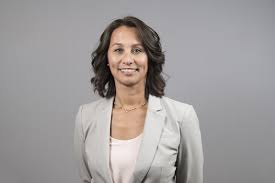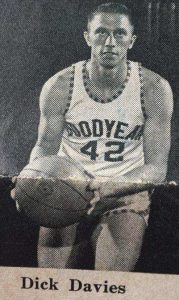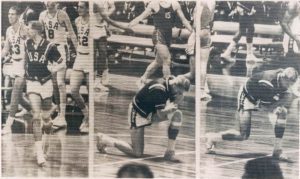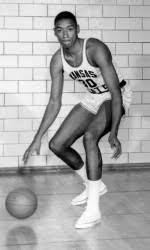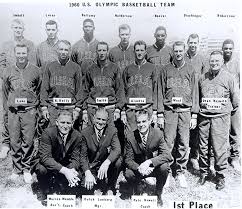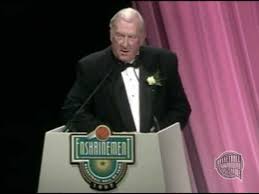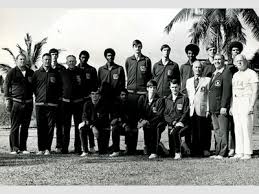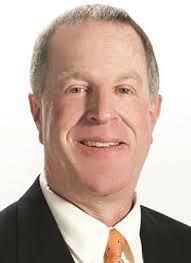CLICK HERE for all of Hoops HD’s Continued and Extensive Preseason Content
We hope you are ready for a season unlike any other: testing, distancing, and bubbles, oh my! Nobody knows exactly what is going to happen, when it is going to happen, or whether anything actually will happen…but in the meantime we will try to restore some order with season previews featuring the best players/coaches/administrators in the country. We continue our coverage with WCC Commissioner Gloria Nevarez. HoopsHD’s Jon Teitel got to chat with Commissioner Nevarez about running a conference and her work on the NCAA’s Men’s Basketball Oversight Committee.
You played basketball at UMass: how good a player were you back in the day, and what made you decide to go to law school at Cal? I was a “hustle kid” who did not put many balls in the hoop. I think I got a scholarship because the softball coach wanted me to play that sport as well…but it is pretty cold back east on the softball diamond! I took a gap year and worked at a law firm, then got a good score on the LSAT, and got into Cal.
You previously taught sports law as an adjunct faculty member for the University of San Francisco Sport Management Master’s program: what are some of the most interesting legal issues that you see in college athletics today? That was 10-15 years ago so the legal issues today are quite different. Name/image/likeness is the biggest one we are wrangling with, as is the ability of student-athletes who want to transfer. We have not modernized our rules about social media and it is long overdue but there are still many questions.
You also served as Pac-12 Senior Associate Commissioner/Senior Woman Administrator: why did the league expand from 10 schools to 12, and why did the men’s basketball tournament relocate to Las Vegas? The expansion was right before our media rights contract was due to expire and the Utah/Denver areas provided big media markets and also allowed us to expand our strong conference brand. The conference tourney used to be in Los Angeles but Las Vegas is an amazing location because it is within driving distance of many of the schools. It became an annual pilgrimage for folks even if their own team was not doing well. The WCC has their tourney there as well: the Gonzaga fans just take over the entire town!
You were instrumental in assisting UCLA when freshmen LiAngelo Ball/Jalen Hill/Cody Riley were detained for shoplifting at 3 high-end stores in China: how did you keep them from potentially facing 10 years in prison, and did LaVar Ball ever send you a thank-you note? I stayed out of the thank-you debate. I was not alone in that: we had a lot of help from UCLA and some other entities. We negotiated a deal that was basically “we promise to leave ASAP/thank you very much”. It was definitely surreal and not something I ever expected to happen during my sports career.
In March of 2018 the WCC Presidents’ Council hired you as the 1st Latina commissioner of a D-1 conference: why did you take the job, and how is it going so far? I was very happy at the Pac-12 but have always loved the WCC. The league competes and wins national titles across all sports from top to bottom. Men’s basketball is very unique/special and was a great opportunity for me. There was so much upside while the media contracts were being renegotiated so it felt like a great fit at the right time. It has been so much fun and we have a great administrative team. We have completely redone our basketball tourney and rebranded our league to be comparable to a big-market D-1 conference. I appreciate working with this group of athletic directors even during the current tough times of COVID.
How close did Gonzaga come to leaving the conference, and how important is Mark Few’s team to the conference? When I first got on board Gonzaga was being courted by the MWC. I had a very transparent conversation with the Zags and by the time I took the job I was the last leg of the relay. I have not heard one negative thing since they chose to stay and the very next season their basketball team was ranked number one in the country. Gonzaga fits in the WCC and can win a national title while elevating our entire league.
You were projected to have 3 top-8 seeds last March in Gonzaga/BYU/St. Mary’s but then you learned that the NCAA tourney was canceled due to the coronavirus: what was your reaction when you 1st heard the news, and do you think that it was the right decision? We were pretty much a lock for three teams in the top half of the bracket, which resulted in some really good policy-making that has helped the depth of our league. I do think it was the right decision to cancel because there was so much that we did not know at the time. We had just finished our own conference tourneys so that week I was wholly focused on COVID. Everything happened so quickly and every league canceled their spring sports as soon as the NBA postponed its own season. I was heartbroken: not just for the men but also for a Portland women’s team that was picked last in the preseason but won the conference tourney and was getting ready to go to the NCAA tourney. Those NCAA tourney events would have been super-spreaders had they occurred.
How is the conference looking basketball-wise next season after losing so much talent such as Filip Petrusev (Gonzaga)/Yoeli Childs (BYU)/Jordan Ford (St. Mary’s)? Reloading is always our specialty and Gonzaga could be the number one preseason team in the country this fall. The nonconference season is where people first start to notice us but that will be tough this year. Keep an eye on Colbey Ross at Pepperdine, as he already owns the school’s assist record; you can also never count out Coach Randy Bennett at Saint Mary’s. We are very optimistic that we will be coming back stronger than ever due to the commitment of the new presidents at each of our schools who are committed to college athletics.
You currently serve on the NCAA’s Men’s Basketball Oversight Committee: I know you are not allowed to share any of the Committee’s private discussions, but what are some of the biggest issues that you are currently trying to resolve? The basketball season! Name/image/likeness is also important, as are transfer issues, but the biggest is when/how to delay the start of the season. We hope to finalize something soon but it depends on saliva testing solutions because we cannot create a bubble like the NBA. There is a lot of reason to hope and we are exploring options for November.
What is it like to be a Mexican-American woman in 2020? I have not really been anything but that my entire life. This part of my identity has only become a “thing” since I was hired as Commissioner but it also gives me a platform to speak on diversity initiatives. The murder of George Floyd allowed our entire league to enact real and meaningful change in the form of the “Russell Rule” which will make us stronger (by requiring schools to include a member of an underrepresented community in the finalist pool for job openings in athletics).

